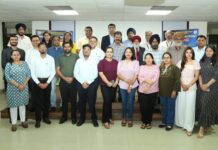Short Term Course on the Internet of Things (IoT) was organized by the Human Resource Development Center (HRDC) and the School of Electronics and Electrical Engineering at Lovely Professional University (LPU). The course aimed to equip participants with data-driven insights from IoT, enabling informed decision-making, predictive analytics, and the skills necessary to thrive in the digital era. The program featured esteemed faculty from LPU as subject matter experts (SMEs), including Dr. Shelej Khera, Dr. Praveen Malik, Dr. Swapnil Bagwari, Dr. Shanky Saxena, Ms. Suverna Sengar, Mohammad Asif Ikbal, and Mr. Ch. Ravi Sankar.
Day 1: The course commenced with Dr. Shelej Khera delivering an insightful introduction to IoT, highlighting its growing significance and potential impact across various industries. The session covered fundamental IoT concepts, applications, and future technological trends. Ms. Suverna Sengar introduced Embedded C programming and the ESP32 microcontroller, focusing on coding techniques and device management, which enhanced participants’ programming skills and understanding of IoT devices.


Day 2: Dr. Shanky Saxena guided participants through the essential topic of sensor interfacing, explaining how sensors can be connected and integrated with the ESP32 microcontroller. He detailed the operational principles of various sensors, communication protocols, and data formats, emphasizing the importance of accurate data capture and processing. Participants were encouraged to adopt a problem-solving mindset and experiment with different sensor scenarios.

Day 3: Mohammad Asif Ikbal focused on advanced data processing techniques, equipping participants with the skills needed to manage data generated by IoT devices. The session covered essential programming concepts such as data filtering, data validation, and decision-making structures, which are crucial for developing functional and reliable IoT systems.

Day 4: Led by Dr. Swapnil Bagwari, Day 4 explored internet connectivity in IoT systems, including the use of MQTT and HTTP protocols for device communication. The session provided a comprehensive understanding of network protocols, cloud integration, and advanced connectivity topics such as WebSockets. By the end of the day, participants had developed the skills to connect their IoT devices to the internet, bridging the gap between device-level programming and cloud connectivity.

Day 5: The focus shifted to an IoT System Integration Project under the guidance of Mr. Ch. Ravi Sankar. Participants applied their skills to design and troubleshoot comprehensive IoT systems, integrating sensors, data processing units, and network modules into a fully functional IoT setup managed through Embedded C programming. This project provided valuable hands-on experience in system integration and collaborative problem-solving.

Day 6: The final day featured a post-training evaluation to assess participants’ understanding and the effectiveness of the training. The course concluded with a valedictory session, where participants expressed their appreciation for the expertise shared by the resource persons. Dr. Sunaina Ahuja, Professor and Dean, Head-HRDC, applauded the organizing team and SMEs for conducting a meaningful and impactful course that met participants’ expectations. Participants provided positive feedback, commending the choice of experts and the well-structured curriculum.

The course successfully equipped participants with practical IoT skills, fostering continuous learning and skill enhancement in this rapidly evolving field.


















